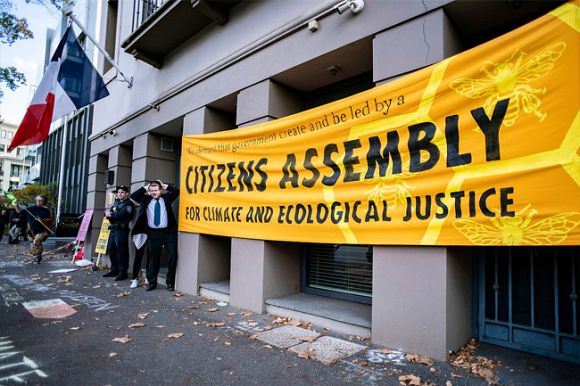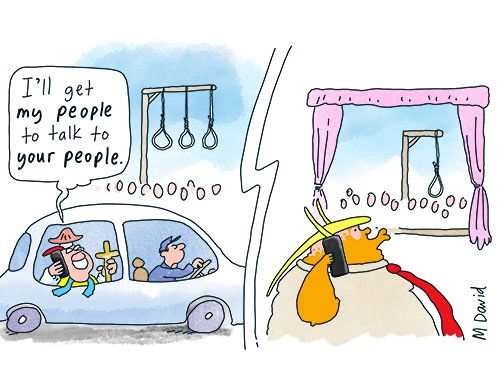With our politicians able to be bought and our democracy in a state of decline, it might be time to explore a revolutionary parliamentary model, writes Victor Kline.
WINSTON CHURCHILL said:
“Democracy is the worst form of government — except for all the others that have been tried.”
For many of us, this “least worst” argument is getting pretty threadbare, particularly as we watch our democracy sliding further from its defining principles every year.
We know this is due to the rise of the professional politician, whose aim is to promote their own advancement to the exclusion of all else. And to achieve that personal advancement, they have to promote the interests of, essentially, a cadre of multinationals plus Rupert Murdoch. And a few other second-division players like big oil, the unions, lesser Murdoch “lookalikes” and a handful of assorted billionaires.
But what they cannot promote is the interests of 99.99 per cent of the population. Indeed, they are not allowed to. If they try, those with the real power will promote them right out of government.
We observe this and we despair. And as we watch one Liz Truss-like farce after another play itself out across the Western world, our despair grows. We thrash around like fish on a hook, trying to find ways to improve our democracy, to stop it from sliding into what looks like its inevitable decline and fall.
But we know that the best we will achieve is some minor successes around the edges: a few more dollars for the 3.2 million below the poverty line; some minuscule relief for small businesses so that, whilst they will all inevitably be swallowed by the multinationals, that might happen a little more slowly; the final release of refugees who have been behind bars for a dozen years or more; a sort of climate policy; and a sort of ICAC.
We know we can’t improve our democracy in any real, meaningful and permanent way. We can’t stop its slide, because it doesn’t suit the powerful for us to do so. And if it doesn’t suit them, it doesn’t suit the politicians and it won’t happen.
This engenders in many of us an understandable sense of impotence. We know what is happening, but equally, we know we can do nothing about it — under the system as it stands.
So let me humbly suggest a whole other way. A wholly new form of democracy. A practical workable form that will eliminate the corrupting elements which are dragging it into the abyss. This idea is a synthesis of the work of many people from around the world. But as this is a practical article, please forgive me if I don’t acknowledge them all and detail their contributions.
So, how would it work? First of all, our parliamentary representatives would no longer be elected. They would be drawn by lot from the electoral roll. Of course, each person drawn out would have to agree to serve. And if they didn’t wish to, another would be drawn out and so on.
In the modern world, it would not be difficult to create an algorithm so that those selected would be numerically representative of gender, race, income, age, state and territory and every other demographic considered necessary to include.
This would, with one blow, eliminate all the influence and corruption which has infected our political system in recent times.
No longer would we have to worry about media barons pumping out fake news and propaganda. They could do it if they wanted, but it wouldn’t get them anywhere because there would be no voters to influence.
No longer could billionaires and multinationals “buy” politicians by funding their campaigns. Because there would be no campaigns.
No longer would politicians have to vote against their own consciences because the party was telling them to or because if they didn’t, they feared not being re-elected.
Each representative would serve for a four-year period, with one quarter resigning and being replaced each year to ensure both turnover and continuity. The age of the professional politician would be at an end.
This is much closer to what happened in ancient Greece, where, most people agree, democracy actually worked. They didn’t have elected representatives. Anyone could attend the Ecclesia (assembly or parliament) and vote for whatever they liked, whenever they liked.
Our system of representative democracy was designed to cope with the fact we have too many people for them all to attend the Parliament. But there is absolutely no reason why our representatives should be chosen the way they currently are, when all that does is open up the system to corruptive influences by the wealthy and powerful.
The important thing would be they represented us – demographically – and voted on our behalf.
For those who would argue this may be a recipe for chaos, I say why? Sure, bills would have to be put forward by individuals, people would vote as individuals and there would be robust debate with a plethora of views being aired. But that sounds a lot better to me that the current system where parliament is just really bad theatre, designed to cover the fact that everything is done, out of the hearing of the public, in back-room deals.
I trust no one will even try to argue that ordinary people are not “qualified” to be politicians. Because if by “qualified” you mean trained in the ways of the modern professional politician, I would say that is not a matter to celebrate.
But in any event, part of the proposal would be that all people selected to serve would receive 12 months of training on full pay before they started; in parliamentary procedure, Constitutional law, ethics, the history of democracy and anything else considered necessary. As such, they would come out far more “qualified” than any current politician.
Then the big question is, how do we make this happen? It would require a referendum, which has to pass the Parliament even before it can be put to the people. And what politician would vote to put themselves out of a job?
Well, once upon a time, the answer would be no one. But we find ourselves at a pivotal point in our political history. The very disgust and frustration with our system, which this proposal is designed to address, has also given rise to the phenomenon of the Independent.
I believe there are several Independents now in the Parliament (Andrew Wilkie springs to mind, but there will be others) who would not hesitate to vote themselves out of a job if they thought it was in the national interest and in the interests of preserving – and indeed improving – our democratic system.
It would be up to these people to take the running on the national stage and in the Parliament itself, and it would be up to us to support them. And when, undoubtedly, the Murdochs and the magnates and the party machines opposed it all, we would simply keep voting for Independents till they had a parliamentary majority and could make it happen on their own.
This is no fantastical suggestion. I believe it is practical, it is doable and it is an idea for its time. I humbly offer you a future without complacent politicians, rapacious multinationals and arrogant media moguls. I offer you a return to a real democracy, of and for the people.
Victor Kline is a writer and a barrister, whose practice focuses on pro bono work for refugees and asylum seekers. You can follow Victor on Twitter @victorklineTNL.
Related Articles
- Australians are being robbed of our democratic rights
- PRESS CONFERENCE: Dave Donovan's Q&A with the Sydney Uni newsroom
- BOOK REVIEW: How to improve Australia’s Democracy – Breaking the Vicious Cycle!
- Right-wing governments are a threat to both U.S. and Australian democracy
- Technology and the internet threaten to undermine democracy
 This work is licensed under a Creative Commons Attribution-NonCommercial-NoDerivs 3.0 Australia License
This work is licensed under a Creative Commons Attribution-NonCommercial-NoDerivs 3.0 Australia License
Support independent journalism Subscribe to IA.
















